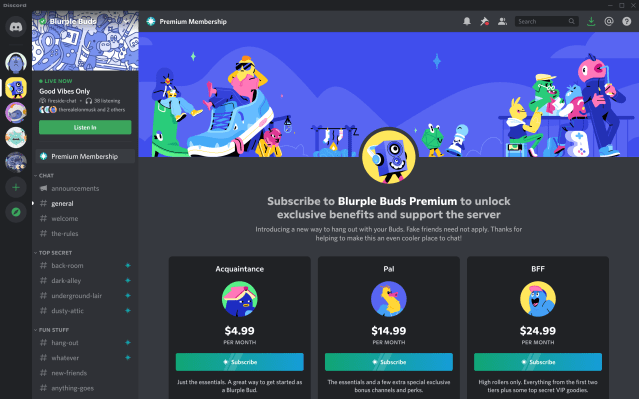Discord is introducing a new way for creators to make money by offering community members access to paid, subscriber-only content. The new premium membership offering was among the company’s most requested features and would bring a new stream of revenue in-house while giving Discord-based communities the option to streamline the tools they use to grow.
Through premium memberships, Discord communities will be able to place part or all of their content behind a pay gate. Servers could remain mostly free and open with one premium paid channel for the most dedicated members or an entire community could go premium, requiring payment for access.
The company is calling premium memberships a “very early pilot” for now and the feature will roll out first to a small group of communities who will test the paid features and offer feedback. Communities in the small test group for premium memberships include a gaming boot camp that provides tutorials and advice, the Trans Community Center and Stream Professor, a server of tutorials on streaming tech.
“It’s important we make running Discord communities more sustainable,” Derek Yang, Discord’s lead product manager for creator products, told TechCrunch. Yang said that the company hasn’t set a date for a broad rollout for premium subscriptions and is taking the product one step at a time to get it right.
Many Discord communities were already using third party services like Patreon to manage access to premium content. With the option brought into Discord itself, communities will be able to create customized tiers of perks that members can subscribe to alongside existing payments they’d make for Discord’s own premium Nitro features.
The company plans to take a 10 percent cut of paid membership subscriptions, though that number could shift in the future depending on how its experiments in creator monetization go. In May, the company began testing ticketed virtual events, its first feature that allowed creators to make money on the platform.
“As we’ve been chatting with more and more creators we wanted to ensure that they can not only build, but maintain and sustain these amazing communities,” the company said in a blog post. “And we’re already seeing that members of these communities are willing to pay creators for the value that is created.”
